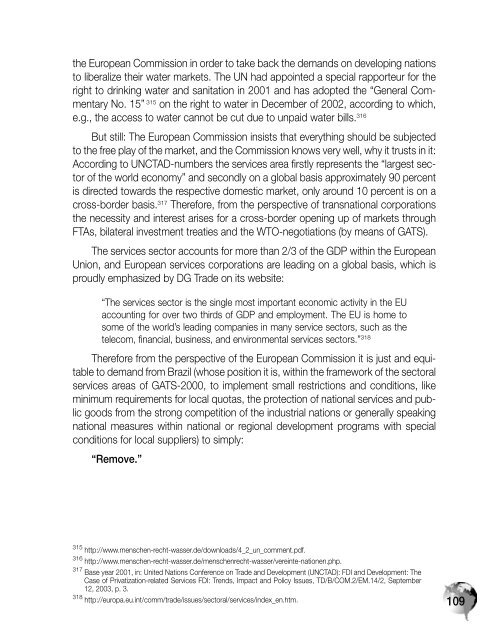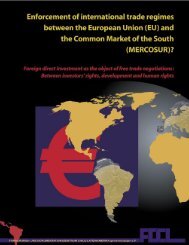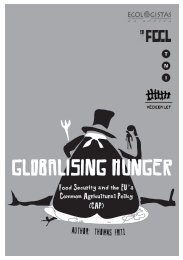Download - FDCL
Download - FDCL
Download - FDCL
Create successful ePaper yourself
Turn your PDF publications into a flip-book with our unique Google optimized e-Paper software.
the European Commission in order to take back the demands on developing nations<br />
to liberalize their water markets. The UN had appointed a special rapporteur for the<br />
right to drinking water and sanitation in 2001 and has adopted the “General Commentary<br />
No. 15” 315 on the right to water in December of 2002, according to which,<br />
e.g., the access to water cannot be cut due to unpaid water bills. 316<br />
But still: The European Commission insists that everything should be subjected<br />
to the free play of the market, and the Commission knows very well, why it trusts in it:<br />
According to UNCTAD-numbers the services area firstly represents the “largest sector<br />
of the world economy” and secondly on a global basis approximately 90 percent<br />
is directed towards the respective domestic market, only around 10 percent is on a<br />
cross-border basis. 317 Therefore, from the perspective of transnational corporations<br />
the necessity and interest arises for a cross-border opening up of markets through<br />
FTAs, bilateral investment treaties and the WTO-negotiations (by means of GATS).<br />
The services sector accounts for more than 2/3 of the GDP within the European<br />
Union, and European services corporations are leading on a global basis, which is<br />
proudly emphasized by DG Trade on its website:<br />
“The services sector is the single most important economic activity in the EU<br />
accounting for over two thirds of GDP and employment. The EU is home to<br />
some of the world’s leading companies in many service sectors, such as the<br />
telecom, financial, business, and environmental services sectors.” 318<br />
Therefore from the perspective of the European Commission it is just and equitable<br />
to demand from Brazil (whose position it is, within the framework of the sectoral<br />
services areas of GATS-2000, to implement small restrictions and conditions, like<br />
minimum requirements for local quotas, the protection of national services and public<br />
goods from the strong competition of the industrial nations or generally speaking<br />
national measures within national or regional development programs with special<br />
conditions for local suppliers) to simply:<br />
“Remove.”<br />
315 http://www.menschen-recht-wasser.de/downloads/4_2_un_comment.pdf.<br />
316 http://www.menschen-recht-wasser.de/menschenrecht-wasser/vereinte-nationen.php.<br />
317 Base year 2001, in: United Nations Conference on Trade and Development (UNCTAD): FDI and Development: The<br />
Case of Privatization-related Services FDI: Trends, Impact and Policy Issues, TD/B/COM.2/EM.14/2, September<br />
12, 2003, p. 3.<br />
318 http://europa.eu.int/comm/trade/issues/sectoral/services/index_en.htm.<br />
109









